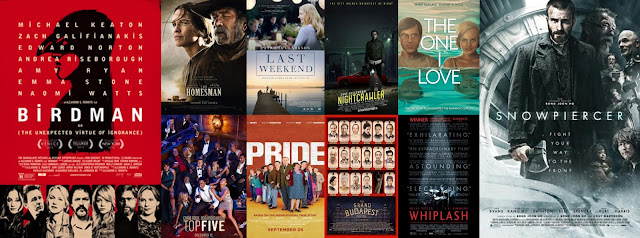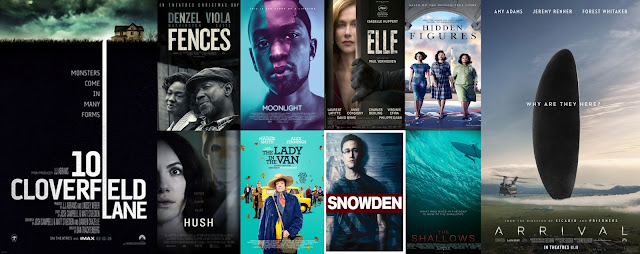Top 10 Films of 2014
Fresh off this morning’s
Oscar nomination announcement, I've decided to share my ten favorite films from
the previous year. Some of these films have been universally recognized of late
– in fact, three of them just received nominations for Best Picture - but several
are (criminally) unsung features that you’ll have to actively seek-out. Hopefully you'll find a few you're interested in checking out.
Because I decided to go with the traditional ten, I was forced to leave off a couple films that I really enjoyed: the Bennett Miller-directed American crime drama, Foxcatcher (starring a fantastically creepy Steve Carrell), documentaries, Elaine Stritch: Shoot Me (a touching last hurrah for Broadway legend Elaine Stritch) and 20,000 Days on Earth (an almost hallucinatory rock-doc on one of the more obscure frontmen in music), the mindless fun of The Lego Movie, as well as the actioner, Lucy (non-traditionally led by a kick-ass female), followed by the "food pornography" of Chef.
16. 20,000 Days on Earth
15. The Lego Movie
14. Lucy
13. Chef
12. Foxcatcher
11. Elaine Stritch: Shoot Me
The following are my
top-ten favorite films of 2014 (in order):
10. Last Weekend
Weekend
and
Richard Linklater’s Boyhood share few
similarities. The former is about a dysfunctional upper-class family on a Labor
Day vacation, while the latter is a twelve-year epic about youth. Nevertheless,
both films offer poignant commentaries on motherhood and the almost tragically inevitable
empty nest. Patricia Clarkson’s, Celia, is sometimes spastic, cold,
overbearing, motherly, and highfalutin, but underneath each of these character
traits is a woman afraid of loneliness, and whose fear of impending abandonment
by her children provides the film with its dramatic (and comedic) core.
Similarly, in Boyhood, the discovery
of these very emotions by Patricia Arquette’s, Olivia, crafts similar results.
In many ways, these characters were the more fascinating in both films, and
perhaps my appreciation for Last Weekend
over the hyped Boyhood is that it
moves Celia front and center, whereas Olivia (particularly for the last half of
the film) is largely a peripheral (or supporting) player. Of course, Weekend has more going for it than
Clarkson. Thematically, the film also delves into other issues, the strongest
among them being upper-class guilt and socioeconomic disparities in romantic
relationships. It is affecting because it tells its stories in an unpretentious,
entertaining fashion, and I was pleasantly surprised.
9. Nightcrawler
Jake Gyllenhaal gives so much edgy charisma to his sociopathic, Lou Bloom, that I found myself admiring his wholly unethical, predatory, manipulative, and deadly tactics. Let me rephrase that – I was admiring the acting – not what the character managed to accomplish (which was pretty shady to say the least). His scenes with Rene Russo – one of which resulted in an obscene (but clever) proposition for sex – are both despicable and riveting. This ain’t no feel good film, and its commentary on local television news’ blood-thirsty (as well as desperate) appetite for grotesque violence and ratings struck me as chillingly accurate.
8. The Homesman
This Tommy Lee Jones-directed Western is quite unorthodox. It hardly concerns itself with the shoot ‘em up ethos we’ve become accustomed to with the genre, and its central figures, uncommonly, are women. Starring a really great Hillary Swank, the film is about an interstate journey between her spinster and Jones’s scoundrel, as they tote three demented, grieving mothers to a special asylum (of sorts). It’s dark, comedic, scary, tragic, and thrilling, sometimes one scene to the next, giving it an epic, episodic feel that fires on all cylinders. Unfortunately, it’s been criminally underrated. I suspect (and hope) audiences will rediscover it, though, once viewing availability becomes more accessible.
7. The One I Love
Independent film concepts
can be polarizing and decidedly audience unfriendly (see: Under the Skin and Lars Von Trier’s glorified, pornographic Nymphomaniac). Still, some manage to wed
unique, fringe conceits with accessible writing, pacing, and direction, that
allows for the film to breathe more universally. The One I Love is a success because it accomplishes this union with
aplomb, allowing us to fully appreciate its artsy exterior and packaging, as
well as its storytelling. I won’t speak on its plot, as the central premise of
the film should not be spoiled. I’ll just say you’ll be tickled, frightened,
moved, and a wee bit creeped out by the time of the third-act.
6. Top Five
The press for Five has been phenomenal, as I’d heard and read about how hilarious it was long before it even had a distributor. Film journalists celebrated Chris Rock for finally helming a feature-film that accentuates his immense comedic talents – and they aren’t wrong – because this movie is bananas. Forget the plot – it’s passable but ultimately superfluous. Forget the love story – again, unnecessary. Go see Five for that cast – because everyone involved (and there are legion) looks like they’re having the time of their lives. That sort of energy just exudes from the screen – and I didn’t want it end! The film is at times quite vulgar (I was surprised, actually), but the jokes are crisp, and the situations are perfect. I’d mention my favorite cameos, but that would be spoiling a large part of Top Five’s fun. So just go see it and laugh yourself crazy.
5. Pride
Public intellectuals and social justice activists have been calling for intergroup cooperation and unionization among marginalized groups for some time. Groups that “represent” blacks, LGBTQ, workers, and women have been making the case that their struggles against the establishment are rooted in a similar oppression, and that their traditionally quasi-battle for public resources and attention is counterproductive. The gentlemen and ladies of the Lesbians and Gays Support the Miners in 1980s London had a similar sentiment. The one difference is that they actively supported a group of traditionally homophobic hardhat communities that initially (and some consistently) fought against receiving financial and material support from “perverts.” Pride is a tale based on this true story. The film is fluff and crowd-pleasing – it’s serious about keeping the mood rather light, even in times of real dramatic heft – but it succeeds so smashingly because the actors appear to be having a lot of fun, the script is razor-sharp, and the story (like all crowd-pleasers) has such a handsome and rewarding conclusion (even when reality tells a different account).
4. Whiplash
Best Supporting Actor-frontrunner JK Simmons and Miles Teller anchor this tense, jazzy thriller about an abusive mentor/mentee relationship. Like all great screen villains, Simmons’ Fletcher has a twisted sense of right and wrong, utilizing fear mongering, sadism, and machismo as pedagogical techniques. For his part, Teller convincingly plays a fledgling jazz drummer with an oft-spurned internal drive toward excellence. Music fans will fall in love with the film, as it embodies an electric, lively energy that never ceases - right to the very last note – indeed, it’s definitely on my tempo (you’ll get it when you see it).
3. The Grand Budapest Hotel
I’ve seen my fair share of Wes Anderson films (from The Royal Tenenbaums to Moonrise Kingdom) and I’ll confess to not “getting” them. His is a quirky style, not unlike a Tim Burton or David Lynch, which attracts a slew of admirers, but can sometimes be inaccessible. Needless to say, I entered Hotel with a bit of uncertainty, but the trailers looked pretty good, so why not? I walked away floored. Everything about the picture was immaculate: the production design, the costuming, the makeup, the storytelling, and the cast –gosh, that cast – led by a hilarious Ralph Fiennes and a bunch of brilliant cameo appearances from familiar faces. The film is obviously a comedy, and at times relies on slapstick and situational extravagance for laughs, but never cheap stunts (or gags) – and most importantly, it doesn’t insult its audience. Yeah, that's right, comedies can still do that.
2. Snowpiercer
Snowpiercer can’t be accused of subtlety. The film’s comment on climate change, classism, and inequality, are worn squarely on its sleeve. This leaves little to the imagination but it ultimately proves to be one of the more innovative action films, anyway. If you can get past the politics (or embrace them, whatever), you’ll find a unique premise (what remains of civilization, post-climate apocalypse, are folks who live on a train that never stops circling the frozen globe), superb acting (particularly, Tilda Swinton), as well as genuine chills and thrills.
1. Birdman (or the unexpected virtue of ignorance)
Michael Keaton is the best-ever Batman. Period. Michael Keaton has been away from Hollywood for some time. Michael Keaton is a great comedic actor who has never really been taken seriously by the industry. Birdman is about Michael Keaton. Well, really it’s about Riggan Thomson, a washed-up, old former actor who played a superhero in the 80s – but this thing is about as meta as meta can get without literally knocking you over the head. And Michael Keaton is brilliant, here. He’s all at once funny, maniacal, delusional, brooding, and moving. I’ve appreciated his acting range since when I was a kid watching Beetlejuice and Multiplicity (less-celebrated but crazy good) – so it’s great to see him finally getting just recognition. Assisting him here is a towering (and also meta) comedic performance from Edward Norton (as an extremely difficult, inappropriate Broadway thespian), Emma Stone (the sulking daughter), Amy Ryan (the bitch ex-wife), Zach Galifianakis (the long-suffering assistant), and Naomi Watts (a neurotic supporting actress) – I highly recommend seeing Birdman – it’s my running away favorite film of 2014.













Speaking of Keaton check out a movie called Gung Ho prolly my favorite with him I think you'd enjoy it
ReplyDelete